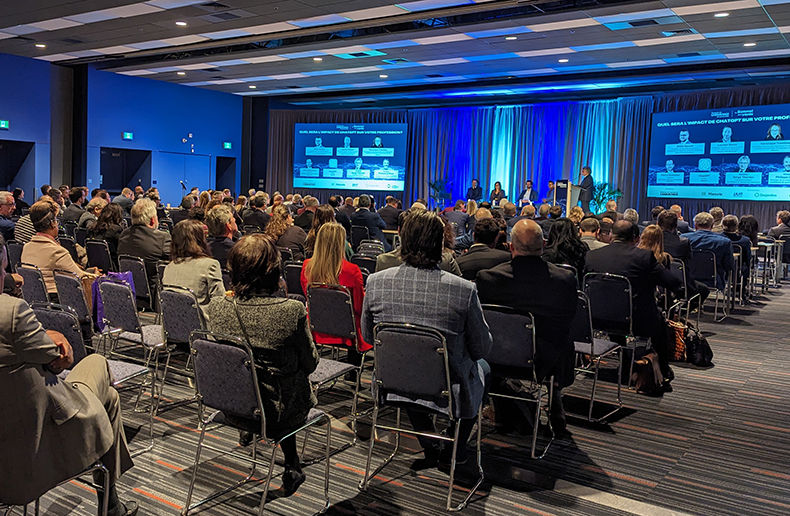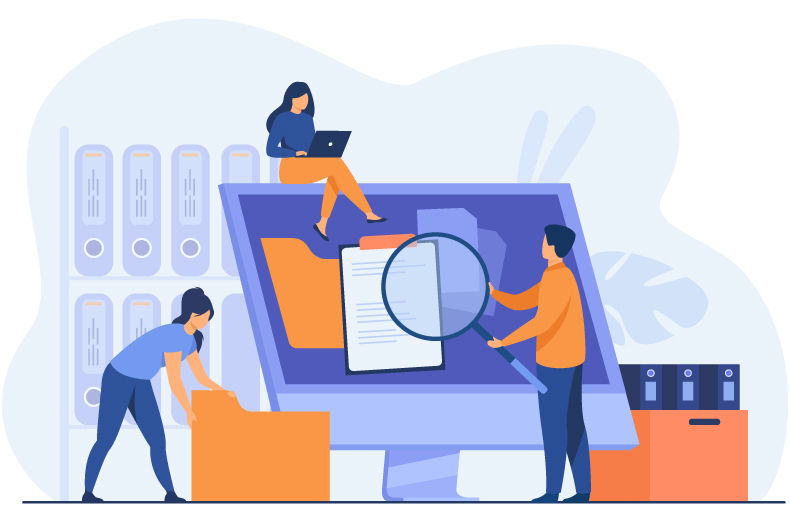
“Today, are ChatGPT and its artificial intelligence challengers enemies or allies? It depends on whether we master them or whether we ignore them,” said Serge Therrien, president of the Insurance Journal Publishing Group, in an article on the future of life insurance published in January 2024 on the Insurance Portal.
Therrien made this statement shortly after the round table he moderated on the subject, during the Congrès de l’assurance de personnes 2023, which took place on Nov. 14. The round table addressed the question of what could be the impact of ChatGPT on the financial advisory profession.

Laurent Simon, a professor in the department of entrepreneurship and innovation and co-director of Mosaic at HEC Montréal, responded that artificial intelligence is not new. “It is already much more present in our lives than we can imagine, in a smartphone, or a car less than 10 years old…”
What is new, according to him, is that ChatGPT responds to queries in almost natural language, thanks to generative artificial intelligence.
Speeding up daily tasks

“In an undergraduate course, I teach innovation management. A lesson plan for an experienced teacher takes about three days of work,” says Simon. ChatGPT took about a minute and a half to generate one. It took him 30 seconds to give him the 10 most cited references per theme covered. “It’s not an ideal plan, but at least I have some material to work with,” the professor says.
According to Simon, the digital tool is not an evolution until it has been translated into daily practices. “This could be to optimize customer files, write emails or even more in-depth tasks.”
Will ChatGPT change your job? For sure! – Véronique Tremblay
Véronique Tremblay, a data scientist at Beneva, seized the opportunity. She recalls that insurers have used artificial intelligence since the 1980s in their probabilistic pricing models. “The model will predict the risk, the amount of the premium… What is new with ChatGPT is that it pretends very well to be a human being,” she says. It is also a probabilistic model, because it predicts the next best answer.” Addressing the audience she said: “Will ChatGPT change your work? For sure. But you have to keep in mind that it could be wrong.”
Tremblay believes that a generative model like ChatGPT is good for summarizing, translating, improving the style of a letter or writing in a very structured manner.
According to Tremblay, ChatGPT can write programming code, but not without errors. “The code I write with ChatGPT never works the first time,” she observes. She also notes that ChatGPT performs much less well in planning and evaluation support queries.
Advisors who use ChatGPT
ChatGPT will never have the value of advice nor have the ability to engage in an exchange and provide leadership to someone – Pierre Dumaine
“I know ChatGPT will never replace an advisor. In front of a client, you are the one who asks the questions to get to know your client. ChatGPT will never have the value of advice nor have the ability to engage in an exchange and provide leadership to someone,” Pierre Dumaine, president of the financial services firm Dumanité, based in the area of the south shore of Montreal, explained to the audience.
On the other hand, Dumaine uses ChatGPT to ask him questions. His team has recently expanded. He must produce an employee manual. “I asked ChatGPT what an employee handbook should contain and it gave me the main features. I was able to confirm them with my HR person. At least I have taken a step forward,” he explains.

The fourth panelist to speak, Willie Savard is an advisor at Altura Groupe Financier, based in the Saguenay-Lac-Saint-Jean region. He is also the creator of Tchat N Sign, a virtual customer interaction application.
He says that ChatGPT has relieved him of blank page syndrome. “I use it for just about everything that involves email and translation,” says Savard. He enters a few words, specifies what he wants to say and to whom. He then asks ChatGPT to create a message that makes sense.

These advisors are not the only ones, given the responses to a survey featured in October 2023 by Éditions du Journal de l’assurance inc. “I sometimes use ChatGPT to respond to my clients. This has proven to be practical in several cases,” replied a participant.
Another said he uses it regularly in his practice, “but never for emails to clients or for a robot”, so as not to compromise the security of sensitive and personal information exchanged. “I use it above all to offer more information to the population by creating publications, video capsules, images, texts, ideas, scripts, etc.”
Competitor or ally?
Is ChatGPT a competitor or an ally of advisors? Philippe Le Roux, director of digital growth at Éditions du Journal de l’assurance, asked ChatGPT the question. Here is a summary of its thoughts presented on the screen behind the panelists:

It will be an ally in efficiency and productivity. “It will be able to help advisors manage routine or administrative tasks more quickly, allowing them to focus on more complex and personalized aspects of their work. It can help write documents, answer standard questions, or even conduct preliminary research.”
It will compete in automation. “Artificial intelligence could potentially automate some of the tasks currently performed by humans. This could be seen as a threat to jobs in some cases. However, this automation is generally limited to repetitive tasks and does not want to replace human judgment, especially in an area as nuanced as financial security.”
What worries me in this last part are the words ‘currently’ and ‘not yet’ – Philippe Le Roux
ChatGPT added, however, that artificial intelligence cannot yet match a human advisor's ability to understand clients' financial and emotional needs. The relationship of trust and professional judgment will be key elements that remain beyond its reach at present, recognizes the conversational robot.
“What worries me in this last part are the words ‘currently’ and ‘not yet’,” underlines Philippe Le Roux. On the sidelines of the event, Le Roux explained that the temporal dimension is fundamental, “because all of this is moving forward at phenomenal speed.” “What seems impossible one day becomes routine a few months later,” he adds.
Returning to the comments of the speakers according to which ChatGPT cannot manage emotions, Le Roux thinks that the ability to capture and take into account emotions is surely on the "road map" of generative artificial intelligence. “I don’t know if it will be here in six weeks, six months or six years, but it’s definitely coming!”
Overly polite
As a financial advisor, you could ask ChatGPT: what are the relevant questions to ask a client? – Laurent Simon
Amused by the live responses obtained from ChatGPT, Laurent Simon and Véronique Tremblay believe that the generative artificial intelligence tool is being polite to advisors. “Looks like someone is monitoring ChatGPT and saying: don’t scare them too much just yet. We don't really know what ChatGPT anticipates for us. If we are polite to it; it will be polite to us. We must dare to go further and ask ourselves the question about the threat,” comments Simon.
Better yet, the advisor can think about the place that ChatGPT could take in his or her business practices. “As a financial advisor, we could ask ChatGPT: what are the relevant questions to ask a client,” suggests the professor. I'm sure we would have a fairly structured answer.”
“ChatGPT is all about pleasing,” observes Véronique Tremblay. It knows the audience it is addressing. It says what you want to hear,” she said.














